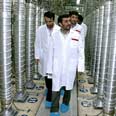
Ahmadinejad in Natanz
צילום: AFP
Report: How Iran obtains US equipment
CBS's 60 Minutes reveals how American technology makes it way to Islamic Republic's military via middlemen who purchase equipment, transfer it to third country, and from there to Iran
WASHINGTON - Despite the sanctions imposed on Iran in the United States, which has banned trade with the Islamic Republic, the country continues to purchase equipment and advanced technology from American companies through middlemen, a report on CBS's 60 Minutes revealed.
According to the report, the middlemen, usually American companies, purchase the equipment legally and transfer it to a third country. The Equipment, which is sold for civilian use in the fields of medicine and media, ultimately makes its way to Iran.
The report showed a photograph of Iranian President Mahmoud Ahmadinejad at the Natanz nuclear facility standing in front of a pressure transducer made in the United States. "The Iranians were trying to acquire these transducers," Clark Settles, a special agent with the US Immigration and Customs Enforcement said in the interview. He added the transducers are an "integral part of enriching uranium."
The problem was first discovered when the US military found American-made components in roadside bombs that took the lives of many soldiers in Iraq. A close look revealed that American companies were unknowingly selling the equipment to a middleman in Dubai, who transferred the equipment to Iran where it was used to make the bombs which were sent to Iraq and Afghanistan against American soldiers.
This discovery led the Americans to launch an investigation, headed by David Kris, head of the National Security Division at the Justice Department.
He said the Iranians can find such equipment anywhere in the world, including the US. "The Iranians will exploit an opportunity if they see one. And whether the guy is sort of some kind of fancy pants, international arms dealer, with a mink coat and a private jet, or whether he's some guy operating out of a basement somewhere in some kind of classic boiler room style operation, it doesn't really matter to them as long as they get the technology that they are seeking at the other end of it," Kris said.
Hundreds of indictments filed against dealers
During the three-year investigation, the Americans managed to file indictments against hundreds of dealers. However, while indictments can be filed within the US, charging suspects abroad is more complicated.
In the coming days French courts are decide on the matter of a man by the name of Majid Kakavand, who was arrested after arriving in Paris for a vacation, at the request of the United State. The Americans are demanding he be extradited, and claim he has tricked several American companies into shipping tens of thousands of electrical components destined for Iran via Malaysia.
One of his clients was an Iranian company by the name of Iran Electronics Industries which sold the components to the Iranian military. Kakavand told 90 Minutes: "I'm not criminal. I haven't done anything. I am innocent."
His attorney Diane Francois said, "Nowhere else in the world this is considered as a crime. Nowhere else except in the United States."
Francois is Kakavand's lawyer in Paris, where he's fighting his extradition to the US She explains that in Europe there are no sanctions against trading with Iran, except when it comes to arms and nuclear sales.
"The United States is somehow asking foreign countries to recognize their embargo, their national defense interest, while it is not at all the one of other sovereign countries," Francois said.










